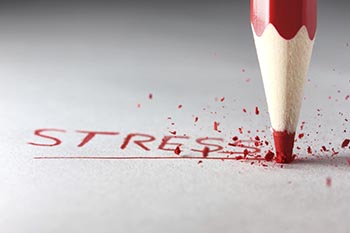The dizzying pace of work, tending to kids, juggling schedules and threats of government collapse can stress even the most composed people, and stress itself becomes a problem.
 “Stress can have many negative effects on the body, such as fatigue, headaches, upset stomach, insomnia, weight loss or gain, muscle tension, and elevated heart rate and blood pressure,” said Jane Roy, Ph.D., associate professor of human studies in the University of Alabama at Birmingham School of Education. “You need to find an activity that helps reduce your stress.”
“Stress can have many negative effects on the body, such as fatigue, headaches, upset stomach, insomnia, weight loss or gain, muscle tension, and elevated heart rate and blood pressure,” said Jane Roy, Ph.D., associate professor of human studies in the University of Alabama at Birmingham School of Education. “You need to find an activity that helps reduce your stress.”
Roy and her human studies colleagues, Larrell Wilkinson, Ph.D., assistant professor, and Retta Evans, Ph.D., associate professor, put heads together to share stress-management tips:
Get moving: All three experts agree that movement is a great, natural way to de-stress.
“A single bout of aerobic exercise appears to affect a particular neurotransmitter that has an antidepressant-like effect in the brain, and the increase in blood flow to the working muscles causes a decrease in muscle tension,” said Roy, who plays tennis to distress.
“It serves as a distractor from the stressor,” she said. “When playing, I have to focus on things like the ball, strategy, score and skill, and not on whatever is causing me to feel stressed. I also play with friends, so we chat and laugh a lot on changeovers.”
Go outside: According to Evans, enjoying nature is a great way to de-stress. She recommends taking 10 to 15 minutes to walk around the neighborhood.
“Research suggests that a natural environment is a de-stresser,” she said. “Anything outdoors, weather permitting, is a great idea because it gets you out of your regular environment. In the event of bad weather, try yoga or basic stretching exercises.”
Breathe: Roy suggests paying attention to breathing.
“When anxious and stressed, we tend to take short, shallow breaths or hold our breath, so doing a simple breathing exercise such as taking deeper, slower breaths can induce a relaxation response.”
Have fun: Find an activity you enjoy that enhances feelings of well-being and relaxation.
“Plan fun activities and enjoy hobbies or engage in interests outside of the job environment,” Wilkinson said.
Eat well: Increase fruits and vegetables intake.
“A poor diet puts the body in a state of physical stress and weakens the immune system,” Wilkinson said. “As a result, a person can be more likely to get infections.”
Think positive: Wilkinson suggested searching for the positives in situations.
“A person with a negative attitude will often report more stress than would someone with a positive attitude,” he said.
Call a friend: Wilkinson also suggested engaging in a trusted network of social support.
“Sometimes having little or no social support will increase the difficulty of dealing with an issue,” he said.
Stretch: “Stress builds up over time and can center in the neck, back and spine,” Evans said. “Stress can cause headaches and lower the immune response. Both exercise and stretching help to relieve stress.”
Unplug: Take 10 minutes of every day to shut everything out, Evans recommended. “Close your eyes and breathe deeply; this can trigger the relaxation response.”